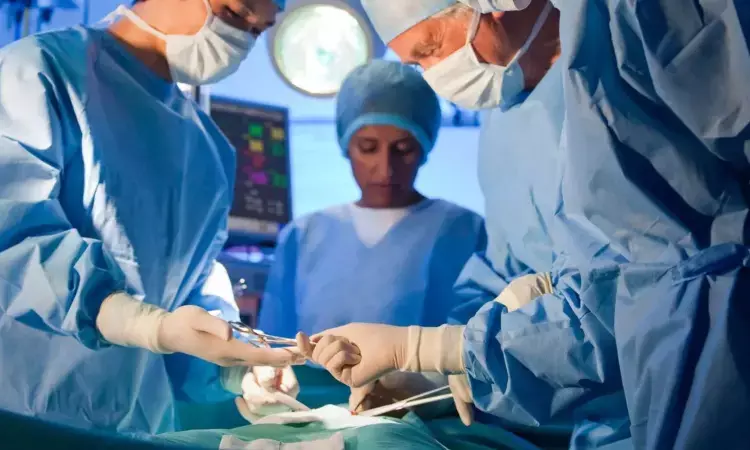- Home
- Medical news & Guidelines
- Anesthesiology
- Cardiology and CTVS
- Critical Care
- Dentistry
- Dermatology
- Diabetes and Endocrinology
- ENT
- Gastroenterology
- Medicine
- Nephrology
- Neurology
- Obstretics-Gynaecology
- Oncology
- Ophthalmology
- Orthopaedics
- Pediatrics-Neonatology
- Psychiatry
- Pulmonology
- Radiology
- Surgery
- Urology
- Laboratory Medicine
- Diet
- Nursing
- Paramedical
- Physiotherapy
- Health news
- Fact Check
- Bone Health Fact Check
- Brain Health Fact Check
- Cancer Related Fact Check
- Child Care Fact Check
- Dental and oral health fact check
- Diabetes and metabolic health fact check
- Diet and Nutrition Fact Check
- Eye and ENT Care Fact Check
- Fitness fact check
- Gut health fact check
- Heart health fact check
- Kidney health fact check
- Medical education fact check
- Men's health fact check
- Respiratory fact check
- Skin and hair care fact check
- Vaccine and Immunization fact check
- Women's health fact check
- AYUSH
- State News
- Andaman and Nicobar Islands
- Andhra Pradesh
- Arunachal Pradesh
- Assam
- Bihar
- Chandigarh
- Chattisgarh
- Dadra and Nagar Haveli
- Daman and Diu
- Delhi
- Goa
- Gujarat
- Haryana
- Himachal Pradesh
- Jammu & Kashmir
- Jharkhand
- Karnataka
- Kerala
- Ladakh
- Lakshadweep
- Madhya Pradesh
- Maharashtra
- Manipur
- Meghalaya
- Mizoram
- Nagaland
- Odisha
- Puducherry
- Punjab
- Rajasthan
- Sikkim
- Tamil Nadu
- Telangana
- Tripura
- Uttar Pradesh
- Uttrakhand
- West Bengal
- Medical Education
- Industry
Carbohydrate loading before colorectal surgery doesn't significantly impact blood sugar control

Canada: A recent study in the International Journal of Colorectal Disease did not show any significant impact of preoperative carbohydrate loading on postoperative blood sugar control in colorectal surgery patients.
The study, however, showed that preoperative carbohydrate was associated with a faster return of bowel function and a shorter length of stay. It merits consideration for incorporation within a colorectal enhanced recovery after surgery (ERAS) protocols.
Preoperative carbohydrate loading minimizes protein losses, modifies insulin resistance, improves postoperative muscle function, and improves patient comfort and well-being. It has been introduced as a critical aspect of many enhanced recovery after-surgery protocols. No studies have evaluated the current evidence for preoperative carbohydrate loading in colorectal surgery.
To fill the knowledge gap, Justin Lu from Temerty Faculty of Medicine at the University of Toronto, Toronto, ON, Canada, and colleagues conducted a meta-analysis to study the impact of preoperative carbohydrate loading on colorectal surgery. They searched the online databases until May 2021 and included RCTs (randomized controlled trials) comparing patients who underwent colorectal surgery with and without preoperative carbohydrate loading. Changes in blood glucose and insulin levels (primary outcomes) were noted.
The search led to 3656 citations, of which 12 RCTs were included. Three hundred eighty-seven patients were given preoperative carbohydrate loading, and 371 patients were included in the control groups.
The study led to the following findings:
- There was no statistical difference in blood glucose and insulin levels between the patient groups.
- In patients receiving preoperative carbohydrate loading, a shorter time to stool (SMD: - 0.50 days) and first flatus (SMD: - 0.48 days) was observed.
- The length of stay was shorter in the preoperative carbohydrate loading group (SMD: - 0.51 days).
- There was no difference in postoperative morbidity and patient well-being between both groups.
The authors stated, "preoperative carbohydrate loading does not notably impact postoperative glycemic control in colorectal surgery patients; however, it may be linked with the faster return of bowel function and a shorter length of stay." It merits consideration for inclusion within colorectal ERAS protocols.
Reference:
Lu, J., Khamar, J., McKechnie, T. et al. Preoperative carbohydrate loading before colorectal surgery: a systematic review and meta-analysis of randomized controlled trials. Int J Colorectal Dis (2022). https://doi.org/10.1007/s00384-022-04288-3
Dr Kamal Kant Kohli-MBBS, DTCD- a chest specialist with more than 30 years of practice and a flair for writing clinical articles, Dr Kamal Kant Kohli joined Medical Dialogues as a Chief Editor of Medical News. Besides writing articles, as an editor, he proofreads and verifies all the medical content published on Medical Dialogues including those coming from journals, studies,medical conferences,guidelines etc. Email: drkohli@medicaldialogues.in. Contact no. 011-43720751


